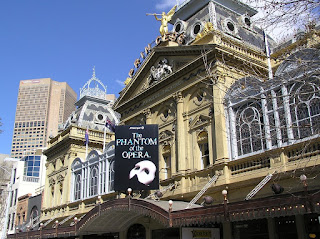Australian theatre started with the traditional ceremonial dances of the Aborigines. European theatre traditions came to Australia in 1788. In 1789, a group of convicts presented the play The Recruiting Officer by George Farquahar to celebrate the birthday of King George of England. However, in 1794, it was determined that the behavior of audiences were so unruly that theatre had a corrupt influence upon the convicts.
In 1796, Robert Sidaway tried to open another theatre in Sydney, Australia. He opened it on Bell Row, which is now known as Bligh Street. Patrons wanting to view a show would pay a s hlling or the equivalent in some type of accepted food offering. The problem was that when the patrons were gone from their homes, criminal swould rob them.
In 1833, the Theatre Royal was opened in Sydney. Then in 1837, the Theatre Royal in Hobart opened. In 1838, Joseph Wyatt opened the Royal V ictoria Theatre on Pitt Street in Sydney. The theatre audiences of the 1840s were wild, rowdy, and ill-behaved.
In the 1850ss, Australia saw an increase in the performances of Opera and Shakespeare. During this time, touring companies brought more theatre to Australia because men who had gone there for the gold rush were looking for entertainment. It was also during this time as well as the 1860s that touring minstrels appeared in Australia.
By the 1880s, the minstrels were becoming less popular. Instead, people were interested in variety and vaudeville. By the 1900s, Australia had developed a national flavor for its theatre. It was mixed with what was considered "legitimate theatre," traditions coming from minstrelry, and popular theatre. This paved the way for theatre to continue growing in Australia.
Throughout the second half of the 20th century, government sponsored theatres popped up across the country. Actors and playwrights also emerged. Today, theatre in Australia is extremely diverse and there are performing arts centers as well as places that specialize in theatre education.
If you enjoy my content, please consider becoming one one of my patrons through Patreon at https://www.patreon.com/TheatreGeek where I will be sharing more in depth content, answering your questions, sharing which types of software I use and how to find them, and more. By becoming my patron, you allow me to create more content about theatre and more theatrical content.

ayam saung tarung sampai mati..
ReplyDelete